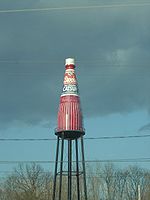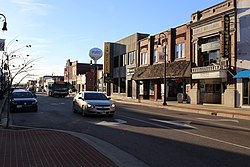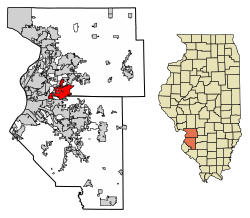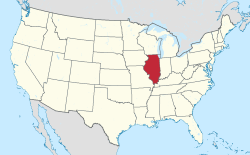Collinsville
Collinsville is a city located mainly in Madison County, and partially in St. Clair County, both in Illinois. As of the 2010 census, the city had a population of 25,579, an increase from 24,707 in 2000. Collinsville is approximately 12 miles from St. Louis, Missouri[3] and is considered part of that city’s Metro-East area.[4] It is the site of the Brooks Catsup Bottle Water Tower,[5] the world’s largest ketchup bottle, and is the world’s horseradish capital.[6]
Cahokia Mounds State Historic Site, a National Historic Landmark and UNESCO World Heritage Site, extends beyond the boundaries of the city toward the west. This prehistoric urban complex is estimated to have had a population of thousands at its peak, long before European exploration in the area. Monks Mound, the largest man-made earthwork in North America, is part of this complex.
Collinsville is the self-proclaimed “Horseradish Capital of the World”, and sponsors an annual Horseradish Festival.[11] The area is said[who?] to produce 85% of the world’s horseradish, of such high quality that Germany and China (key users of the herb) import it for gourmet use. The Horseradish Festival is held annually during the first weekend in June at Woodland Park located off Route 159 in Collinsville. It has activities for all ages, including a 5K run, live music, a beauty pageant, and root-grinding demonstrations.[11] One of the most popular events is the Root Derby, sponsored by American Family Insurance, for which participants make a derby car from a horseradish root and race the “vehicles” during the festival.
Known for its large ethnic Italian population, descendants of late 19th and early 20th-century immigrants, Collinsville hosts an annual Italian Fest in the fall. The Italian Fest has been held annually since 1983 and is located in uptown Collinsville on Main Street. This two-day festival celebrates everything Italian; it features live music and vendors selling authentic Italian food such as spedini, spumoni, bagna cauda, cannoli, and Italian Ices. Other activities include a parade, midnight bike ride, 5K Run/Walk, Little Miss & Mister Pageant, Bocce Ball Tournament, and a grape stomp.[12]

The Brooks Catsup Bottle Water Tower, a water tower in Collinsville.
Collinsville is the site of the Brooks Catsup Bottle Water Tower, “the world’s largest catsup bottle”, a 170-foot-tall (52 m) water tower in the shape of a ketchup bottle, which is listed on the National Register of Historic Places.[13] The bottle along with the property was put up for sale for $500,000.00 on July 12, 2014.[14] In order to celebrate this roadside landmark, Collinsville hosts an annual World’s Largest Catsup Bottle Festival in July.[15]
The Cahokia Mounds State Historic Site is located within the city limits of Collinsville. The largest Pre-Columbian settlement north of Mexico, it was developed by the Mississippian culture. This large park has been designated as a National Historic Landmark and was one of the first eight UNESCO World Heritage Sites designated within the United States; today there are a total of 23. At its peak about 1200 CE, Cahokia had a population of 20,000-30,000, more than any city in the present-day United States until after 1800. It includes Monks Mound, the largest prehistoric earthwork in the Americas, and more than 70 surviving smaller mounds. Monks Mound is larger at its base than the Great Pyramid of Giza. A museum and visitors’ center provide a movie and displays which present the lives of the ancient inhabitants.[16]
During the French colonial era of its Illinois Country, a group of French Catholic monks had a settlement on Monks Mound, after whom it was later named. They cultivated agriculture on the terraces of the mound. They traded with bands of the historic Illini, who had migrated into the area after the peak of the Mississippian culture.
Collinsville was originally settled by the Cook family and by a group of German-American settlers who arrived by Conestoga wagon in 1812 from Pennsylvania. They founded Holy Cross Lutheran Church. They also had a hardware store, though they were mainly farmers. Within five or six years, a number of other settlers arrived and began to organize the legal work required to form a town on the site. These original settlers are all buried in the Cook Cemetery or the Old Lutheran Cemetery. Other early settlers are buried in the Old German Cemetery near Sugarloaf Road near Maryville, Illinois.
During World War I, a Collinsville mob, composed mostly of local coal miners, lynched a German immigrant, the only such wartime murder in the country. On April 5, 1918, the mob numbering up to 300 men took Robert Prager from his home and paraded him through the streets barefoot and wrapped in an American flag, forcing him to sing patriotic songs. Collinsville police interceded and took Prager into protective custody. The mob was later mistakenly allowed to search city hall, and two men found Prager hiding in the basement. They took Prager outside and the mob marched him to the outskirts of town, along the St. Louis Road, where they lynched him.[17] His final request was to be buried in the American flag. Eleven men stood trial for the murder, but all were acquitted on June 1, 1918.[18]
Collinsville High School, whose teams are stylized as the Kahoks (named for a fictional Native American tribe), has won several Illinois State Championships, in 1961, 1965 (basketball), 1980 (baseball), 1981, 1986, 1991, 1992 (soccer), and 2007, 2008, 2009, 2011 (Dance Team).
The Fairmount Park Racetrack for horse racing is located in Collinsville. The racetrack is owned by the corporation Ogden-Fairmount Incorporated. This is one of five race tracks in Illinois, and the only one located outside Chicago. Fairmont Park Racetrack features a one-mile oval dirt track and opened in 1925. The racetrack originally hosted both Thoroughbred flat racing and Standardbred harness racing. The racetrack has hosted popular races, including the Fairmont Derby in the 1920s and the St. Louis Derby in 2006, along with other weekly live races. Three restaurants are located at the track for visitors to enjoy: the Top of the Turf, the Black Stallion Room, and the 1st Turn Café.[19] Admission for live racing is $1.50 per person on Tuesdays and $2.50 per person on Fridays and Saturdays.[20]
Several historical buildings survive in Collinsville. Built in 1885, the City Hall is still used today. It was built on property originally owned by the Collins family. The building features Italianate architecture with window crowns. A short, half-block walk from City Hall is the State Bank of Collinsville at the corner of Center and Main streets. Designed in 1916 by architect Robert G. Kirsch, this structure features limestone exterior and marble interior walls. Although no longer operated as a bank, the building still impresses visitors. To the west on Main Street, the Collinsville Public Library is a colonial-style brick building with an inviting circular stone walkway; the first section was completed in 1937. Additional wings were added in 1967 and 1980.[21]
Collinsville | |
|---|---|


Motto(s):


Location of Illinois in the United States
Coordinates
Country
United States
State
| Illinois |
County
Government
• Type
Area
[1]
Total
14.85 sq mi (38.46 km2)
Land
Water
Population
(2010)
Total
Estimate
(2018)[3]
Density
5,200/sq mi (2,000/km2)
FIPS code
Website
Woemmel is a St. Louis based Plastering company with a concentration in Residential, Commercial, Ornamental, and Plater Repair.

